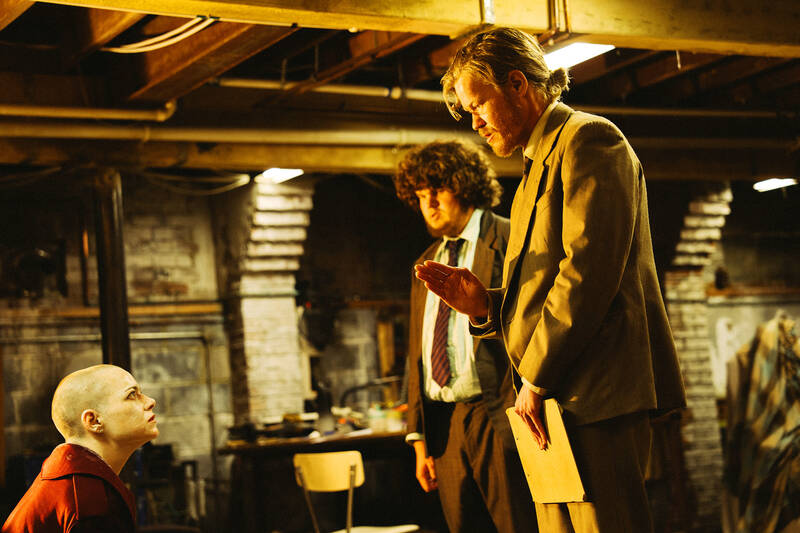The twisted filmography of Yorgos Lanthimos has by now trained us to expect darkly comic visions of contemporary life, both savage and mundane. His movies have perhaps inspired the most “What?!” reactions of the last decade, partly because they’ve tried so hard to do so.
His movies — farces, fables, experiments — reside in surreal worlds of their own. But his latest, Bugonia, is thrillingly, if tragically, tied to our reality. It might even be his best film. Though I’ve been apprehensive about the flamboyant severity of Lanthimos’ movies, I found Bugonia, a chamber-piece gut punch, hard to shake. For starters, it’s difficult to resist any movie with a line in it like: “There’s Andromedan code all over your Instagram.”
That’s one of the things that Teddy (Jesse Plemons), an incel eco-terrorist, says to Michelle (Emma Stone) after kidnapping her with his neurodivergent cousin Donny (newcomer Aidan Delbis) and tying her up in their basement. Teddy and Donny live together in a fairly remote, rundown old house. There, Teddy tends to both his bees and to unhinged conspiracy theories.

Photo: AP
But as Plemons so deftly plays him, Teddy doesn’t seem like a lunatic. He might reach wildly insane conclusions, such as that Michelle, a pharmaceutical company chief executive, is an alien. But he’s thoughtful in nature and sweetly cares for his cousin. It’s a feat of Plemons’ innate good nature that we kind of like Teddy, even as he shaves Michelle’s head, to prevent “it,” as he calls her, from contacting the mothership.
The opening moments of the script by Will Tracy (The Menu, episodes of Succession) cast these demented shenanigans in an apocalyptic light. The fate of bees is much on Teddy’s mind; colony collapse disorder, often caused by pesticides, is one of his talking points. It’s a phenomenon that, in Bugonia — a movie reckoning with, or maybe just lamenting, humanity’s fate — isn’t just for the bees.
While Stone’s abilities alone might legitimize extraterrestrial suspicions, there’s more to why Teddy has pinpointed Michelle. She’s a lauded corporate leader; her office includes a framed Time magazine with her on the cover and a photograph with Michelle Obama. Her company, Auxolith, operates out of a sleek office building where Michelle presides over her workforce like a queen bee. She has the corporate lingo of “transparency” and “diversity” down pat, but whether she actually adheres to any of those ideals is dubious, at best. Before Teddy and Donny jump her, she announces a “new era” at Auxolith where employees leave at 5:30pm. But not if they haven’t met their quota, she adds. And not if they’re, you know, busy.

Photo: AP
In that way, Michelle is a camera-ready cover for whatever Auxolith is up to, which, as the movie goes along, teases out a poisonous history, including opioid manufacturing that affected Teddy’s mother (Alicia Silverstone).
The bulk of Bugonia is the ideological dialogue between her and Teddy back in the basement. It’s a conversation, laced with contemporary divides, that is comical for its impossibility. One is addled by paranoia and extremism, the other knows only heartless corporate speak. Understanding each other is futile. Watching Stone, as Michelle, attempt to reason with Teddy is part of the movie’s dark fun, just as is seeing Plemons’ Teddy resolutely stick to his certainty that Michelle is part of an alien infiltration of Earth that he wants gone by the next lunar eclipse.
The source of such a wild narrative can only come, of course, from South Korea. Bugonia is loosely based on the 2003 Korean film Save the Green Planet! All of Lanthimos’ most notable films before have been written with either Efthimis Filippou (Dogtooth, The Lobster) or Tony McNamara (Poor Things, The Favorite). But, otherwise, Bugonia has the feel of a quick follow-up to last year’s Kinds of Kindness, a black-comedy triptych also led by Stone and Plemons.
Yet what could easily be mistaken for a tossed-off, in-between movie — there are only a handful of characters and a few scene locations — ends up feeling like a culmination-slash-nadir for Lanthimos. Having made a dozen films darkly satirizing the sad, primal folly of humankind, it’s comeuppance time in Bugonia.
The movie drags in the middle, when it’s locked in a prisoner drama that grows a little tiresome and predictable. But the payoff is immense. Teddy calls his torture chamber “the headquarters of the human resistance.” By the time Bugonia reaches its unforgettable finale, it’s made chillingly clear just how feeble any such movement might be, and the movie’s apocalyptic air of resignation, of fait accompli, sounds a chastening death knell.

Growing up in a rural, religious community in western Canada, Kyle McCarthy loved hockey, but once he came out at 19, he quit, convinced being openly gay and an active player was untenable. So the 32-year-old says he is “very surprised” by the runaway success of Heated Rivalry, a Canadian-made series about the romance between two closeted gay players in a sport that has historically made gay men feel unwelcome. Ben Baby, the 43-year-old commissioner of the Toronto Gay Hockey Association (TGHA), calls the success of the show — which has catapulted its young lead actors to stardom -- “shocking,” and says

The 2018 nine-in-one local elections were a wild ride that no one saw coming. Entering that year, the Chinese Nationalist Party (KMT) was demoralized and in disarray — and fearing an existential crisis. By the end of the year, the party was riding high and swept most of the country in a landslide, including toppling the Democratic Progressive Party (DPP) in their Kaohsiung stronghold. Could something like that happen again on the DPP side in this year’s nine-in-one elections? The short answer is not exactly; the conditions were very specific. However, it does illustrate how swiftly every assumption early in an

Inside an ordinary-looking townhouse on a narrow road in central Kaohsiung, Tsai A-li (蔡阿李) raised her three children alone for 15 years. As far as the children knew, their father was away working in the US. They were kept in the dark for as long as possible by their mother, for the truth was perhaps too sad and unjust for their young minds to bear. The family home of White Terror victim Ko Chi-hua (柯旗化) is now open to the public. Admission is free and it is just a short walk from the Kaohsiung train station. Walk two blocks south along Jhongshan

Francis William White, an Englishman who late in the 1860s served as Commissioner of the Imperial Customs Service in Tainan, published the tale of a jaunt he took one winter in 1868: A visit to the interior of south Formosa (1870). White’s journey took him into the mountains, where he mused on the difficult terrain and the ease with which his little group could be ambushed in the crags and dense vegetation. At one point he stays at the house of a local near a stream on the border of indigenous territory: “Their matchlocks, which were kept in excellent order,